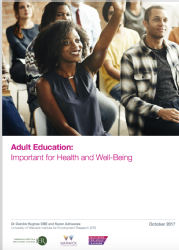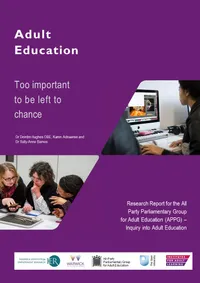IER News & blogs
Adult education

Blog from Dr Deirdre Hughes OBE, Research Programme Director & Associate Fellow at IER.
The numbers of adults participating in formal education is in serious decline in local communities. Adult education maximises engagement, retention and progression for those who might otherwise become lost in the less tailored support offered in Further Education provision. Four key themes need to be urgently addressed by Secretaries of State, Ministers, policy-makers and providers:
- Greater alignment of strategic priorities and funding streams - Adult education should feature in national and local strategic priorities.
• There is a need to promote adult education’s role in healthcare prevention strategies that contribute towards easing demand on acute health services. This needs Ministerial interest and commitment to bring about the necessary policy changes that will put adult education in a sustainable position for the future.
• Greater flexibility and alignment of funding streams can support targeting individuals and groups most in need. Changes to funding since 2010 have squeezed the social infrastructure between adult education, Further Education (FE) and wider community-based organisations. Whilst closer collaborative working is underway to share expertise and services, this remains piecemeal.
-
Capturing the evidence - There is much evidence of the positive impact and efficacy of adult education on individuals, communities and other public services; however, it is often neglected by policy-makers.
• Secretaries of State, Ministers, and those responsible for NHS ‘Sustainability and Transformation Partnerships’ (STPs), NHS Improvement, Health and Well-Being Boards, Clinical Commissioning Group (CCGs), Local/Combined Authorities and Local Enterprise Partnerships (LEPs) need to have greater access to the evidence of successful policies and practices through adult education. There is a critical need to build upon existing health and well-being surveys to identify any gaps in research, including those that examine whether short, part-time community learning courses help people develop strategies to manage their everyday lives more effectively.
• There are significant benefits to be gained in capturing contextualised adult education, health and wellbeing e.g. the Good Things Foundation and its work with NHS shows health inequalities account for well in excess of £5.5 billion in healthcare costs to the NHS annually. Based on a cost to the NHS of £45 per GP visit, ensuring everyone had the Basic Digital Skills to access health information online would provide savings of £121 million a year by 2025. Other research in the report points to cost benefits and savings. There is significant scope to produce more podcasts/videos of adult education in care homes, healthcare centres, schools, community centres, libraries and workplace settings, to inspire individuals and family learning.
-
Getting the message across - There are missed opportunities for collaborative and co-productive work between sectors and professionals. As a result of fragmented national policies, people often fall between the gaps in health and education practice.
• National and local policies must focus on ratcheting up the demand for adult education provision, particularly from healthcare sectors (and in healthcare contexts).
• Social prescriptions that include ‘prescribing for learning’ should help partnerships to engage with the process of creating a healthy society and focusing on the health and well-being of individuals.
- All policy interventions should consider how inequality can best be addressed
The Social Mobility Commission indicates new divides have opened up in Britain, across geographies, income groups and generations.
Adult education: important for health and well-being

This latest research, commissioned by the Institutes for Adult Learning, aims to increase awareness of the benefits that adult education can bring to the nation's health and well-being. It also aims to stimulate dialogue on how central and devolved government policies and practices can ensure that adult education remains a strategic priority.
So much evidence points to the fact that adult education makes a significant contribution to the health and well-being of individuals and communities. It can be relied upon to assist in addressing national policy challenges such as encouraging and enabling individuals and families to take a more active role in their own health and well-being. However, this added-value contribution is at serious risk of being lost in a policy landscape pre-occupied with apprenticeships, skills and qualification reforms. Devolution presents some real opportunities in local economies to address the skills shortages expected to follow Brexit.
Our evidence points to three key messages:
- Adult education does help keep individuals well and supports longer and productive lives.
- Adult education does help meet major challenges such as: ageing, loneliness, long-term conditions, mental health and well-being and community cohesion.
- Adult education does help save money in the National Health Service (NHS) and the social care system.
Six recommendations are outlined in the report. These are aimed at local, regional and national policymakers, educationalists, NHS 'Sustainability and Transformation Partnerships' (STPs), Health and Well-Being Boards, Clinical Commissioning Group (CCGs), Local/Combined Authorities and Local Enterprise partnerships (LEPs) and others working in the Health and Social Care Sector. This report builds upon earlier research 'Adult Education: Too Important To Be Left To Chance' (2016).
IER delivers labour market analysis training for Nigerian Government agency

IER has been commissioned by the Nigerian Government’s Industrial Training Fund (ITF) to provide training to its staff to help them develop labour market analysis in Nigeria.
The Nigerian Government wants to broaden its economic base. Currently there are gaps in labour market information and capacity to develop that information. The ITF approached IER to provide training to enable them to establish better and more policy-orientated employment research. IER hosted 5 visitors from the ITF over June and July 2017 including the Director General of the ITF, Sir Joseph Ari.
IER staff delivered training modules on: labour market assessment and forecasting; vocational education and training, including apprenticeships; higher education and the graduate labour market; labour market classification and measurement; careers guidance and labour market information (LMI) for all. Returning to Nigeria, the participants will now cascade this knowledge base across the ITF.
Regarded as a success by Sir Joseph Ari, IER will now work with the ITF to expand the training programme over the rest of this year and into 2018.
Investing in adult education: health and well-being benefits

The APPG for Adult Education commissioned the Warwick Institute for Employment Research in 2016 to conduct research into the needs of adult learners. This work was supported by the Institutes for Adult Learning (IALs). The nine Specialist Designated Institutions (SDIs), including City Lit, Morley College, Hillcroft College, Northern College, Ruskin College, Working Men’s College, Mary Ward Centre, Fircroft College and the Workers’ Educational Association (WEA),– each has its own identity, mission and distinctive approach, which adds to the rich diversity of adult education.
Our primary focus was on adult education, and on adults returning to learn. Learning can occur in education or training institutions (offline or online), the workplace (on or off the job), the family, or cultural and especially, community settings. Findings from this in-depth study highlighted local and newly Combined Authorities will be accountable for the allocation of funds with Local Enterprise Partnerships (LEPs) in setting the agenda and identifying priorities within local communities. It is, therefore, critical that the contribution of adult education, including its contribution to improving health and well-being (which are pre-requisites for progression into and within employment), must not be lost or forgotten within current and any new devolution arrangements.
It is clear that most providers of adult education have invested in reaching out to people who are disadvantaged one way or the other. Many of whom would not otherwise know about adult education and what it could do for people in their circumstances. Adult education providers have developed the expertise, teaching skills and resources to deliver non-qualification provision and/or bite-sized units that successfully engage these adults in learning again, offering a stepping stone to success. Therefore, any policy or practical interventions need to reflect this and provide flexibility. Post-devolution, local Skills Commissioners will be required to make investment decisions - which is why their role is so central to the sustainability of adult education now and in the future.
IER'’s formal ‘Call for Evidence’ in 2017 has a distinctive focus on adult education, health and well-being. The main purpose is to gather the views of key stakeholders, partners and providers on the contribution of adult education to health and wellbeing outcomes. We have deliberately not attempted to define the parameters of the Call For Evidence too tightly as we want respondents to explore many different aspects of health and wellbeing. We hope to hear from those interested in any aspect of physical or mental health, including health and wellbeing in the context of age, disability, ethnicity, gender and location. For further information contact: Dr Deirdre Hughes OBE, deirdre dot hughes at warwick dot ac dot uk.
Adult Education Strategy: England
 Findings from IER’'s ‘Call for Evidence’, Town Hall meetings and interviews with senior leaders highlight a stated danger that national policy for adult education could disappear by 2020. Dr Deirdre Hughes OBE delivered a presentation to the All Party Parliamentary Group for Education this week. She has been formally invited to review and discuss the current policy and funding context, including key developments since July 2016. The APPG Chair, Chi Onwurah MP and Vice Chairs, Baroness Goudie and Peter Bottomley MP will jointly host the event. For more on the project.
Findings from IER’'s ‘Call for Evidence’, Town Hall meetings and interviews with senior leaders highlight a stated danger that national policy for adult education could disappear by 2020. Dr Deirdre Hughes OBE delivered a presentation to the All Party Parliamentary Group for Education this week. She has been formally invited to review and discuss the current policy and funding context, including key developments since July 2016. The APPG Chair, Chi Onwurah MP and Vice Chairs, Baroness Goudie and Peter Bottomley MP will jointly host the event. For more on the project.
Hughes, D., Adriaanse, K. and Barnes, S-A. (2016) Adult Education: Too important to be left to chance. London: All Party Parliamentary Group for Adult Education.
